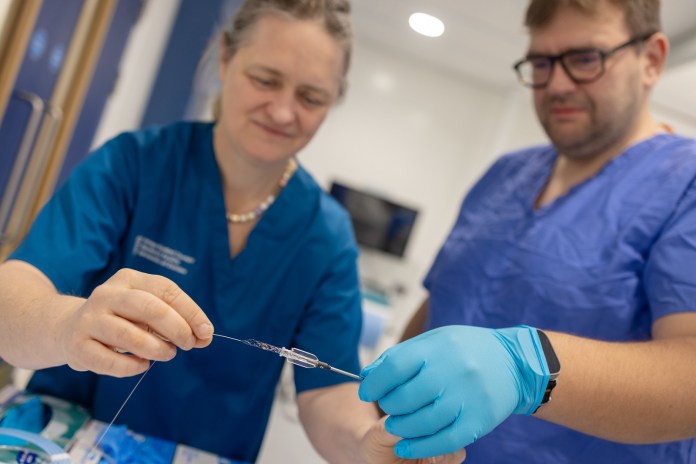Science
University of Dundee Achieves Landmark Robotic Stroke Treatment

Researchers at the University of Dundee have pioneered a new chapter in stroke treatment by successfully performing the first robotic transatlantic thrombectomy. This groundbreaking operation took place after Professor Iris Grunwald, director of the Image Guided Therapy Research Facility (IGTRF), conducted the initial remote thrombectomy on a human cadaver. The innovative procedure utilized a robot developed by the Lithuanian medical technology company Sentante, demonstrating that a blood clot can be effectively removed without a specialist physically present.
The momentous operation was executed by Dr. Ricardo Hanel, who used Sentante’s device to conduct the first transatlantic thrombectomy from the Baptist Medical Center in Jacksonville, Florida. The Sentante system employs a series of wires and catheters connected to a device that magnifies and translates the surgeon’s hand movements in real time. This allows the robot at the patient’s bedside to replicate those movements, providing authentic feedback to the surgeon’s fingertips and mimicking the experience of manual surgery.
Professor Grunwald expressed her excitement about the potential of this technology, stating, “As a neurointerventionist, it is remarkable to feel the same fine control and resistance through a robotic interface as during a live procedure.” She added, “Sentante’s technology truly bridges the gap between operator and patient, no matter the distance.”
Each year, approximately 15 million strokes occur worldwide, with the UK bearing an annual cost of around £26 billion, which includes £8.6 billion for the National Health Service (NHS) and social care. Thrombectomy is recognized as the most effective treatment for patients suffering from strokes caused by large, blocked brain vessels. Despite its efficacy, less than 1% of patients globally receive this life-saving intervention. In 2024, only 212 patients in Scotland underwent thrombectomy, accounting for just 2.2% of those who experienced an ischemic stroke.
Professor Grunwald highlighted the urgency of timely treatment, noting, “By the time patients reach a specialist centre, there’s often no brain left to save. Every six-minute delay in receiving treatment equates to a 1% lesser chance of a good outcome.” She advocated for expanding specialized training to enable experts to operate remotely, enhancing access to this critical procedure.
Dr. Hanel emphasized the transformative potential of tele-neurointervention, stating, “To operate from the US to Scotland with a 120 millisecond lag is truly remarkable.” As the official world training centre for doctors at the World Federation for Interventional Stroke Treatment, the IGTRF collaborates with Dundee’s Centre for Anatomy and Human Identification (CAHID) to provide comprehensive interventional training, medical device testing, and research opportunities.
Edvardas Satkauskas, co-founder and CEO of Sentante, praised the collaboration, stating, “The human cadaveric models at Dundee are fantastic. This is probably the only site in the world that can conduct this type of research.” He emphasized the critical time factor in treating ischemic strokes, where the difference between walking out of the hospital and facing a lifetime of disability can be as little as two to three hours.
Sentante’s robotic platform is advancing through regulatory processes for peripheral vascular interventions, with the U.S. Food and Drug Administration granting Breakthrough Device Designation for its stroke system. This collaboration with the University of Dundee marks a significant milestone, showcasing how robotics can eliminate distance as a barrier to life-saving care.
-

 Entertainment2 months ago
Entertainment2 months agoAndrew Pierce Confirms Departure from ITV’s Good Morning Britain
-

 Health5 months ago
Health5 months agoFiona Phillips’ Husband Shares Heartfelt Update on Her Alzheimer’s Journey
-

 Health5 months ago
Health5 months agoNeurologist Warns Excessive Use of Supplements Can Harm Brain
-

 Science3 months ago
Science3 months agoBrian Cox Addresses Claims of Alien Probe in 3I/ATLAS Discovery
-

 Entertainment1 month ago
Entertainment1 month agoGogglebox Star Helena Worthington Announces Break After Loss
-

 Science3 months ago
Science3 months agoNASA Investigates Unusual Comet 3I/ATLAS; New Findings Emerge
-

 World1 week ago
World1 week agoEastEnders Welcomes Back Mark Fowler Jr. with New Actor
-

 Entertainment3 months ago
Entertainment3 months agoTess Daly Honoured with MBE, Announces Departure from Strictly
-

 Entertainment7 months ago
Entertainment7 months agoKerry Katona Discusses Future Baby Plans and Brian McFadden’s Wedding
-

 Science3 months ago
Science3 months agoScientists Examine 3I/ATLAS: Alien Artifact or Cosmic Oddity?
-

 Entertainment4 months ago
Entertainment4 months agoLewis Cope Addresses Accusations of Dance Training Advantage
-

 World2 months ago
World2 months agoBailey and Rebecca Announce Heartbreaking Split After MAFS Reunion









